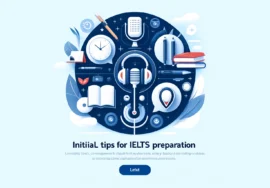
Speak Fluently in Your IELTS Exam: Unlock Your Inner Chatterbox
Master fluency in your IELTS Speaking test with techniques to boost confidence, expand vocabulary, and overcome nerves. Achieve your desired score with ease!
Speak Fluently in Your IELTS Exam: Unlock Your Inner Chatterbox
The IELTS Speaking test can feel like a high-pressure performance, but fluency is key to achieving a good score. Think of it as a conversation, not an interrogation! This guide is your backstage pass to smooth and confident communication, helping you overcome those dreaded “umm” and “ahh” moments and express yourself clearly and effectively. With dedication and the right strategies, you can transform your speaking skills and approach the test with poise and confidence.
Why Do We Hesitate? Identifying the Roadblocks
Hesitation in the IELTS Speaking test can happen for several reasons. Recognizing these challenges is the first step to overcoming them:

- Nerves and Anxiety: It’s perfectly normal to feel nervous in an exam situation. The pressure to perform well can make you stumble over your words or freeze up altogether. Many test-takers report feeling a heightened sense of apprehension when faced with a time limit or direct questions.
- Lack of Vocabulary: Sometimes, you might hesitate because you can’t find the right word to express your thoughts. A limited vocabulary can make it difficult to articulate your ideas precisely, leaving you grasping for synonyms or simpler phrases that might not fully convey your meaning.
- Grammatical Uncertainty: If you’re unsure about the correct grammar to use, you might hesitate or self-correct, disrupting your flow. This is particularly common when forming complex sentences or using unfamiliar verb tenses.
- Lack of Practice: The more you practice speaking English, the more fluent you’ll become. If you haven’t had much practice, it’s natural to feel less confident and more hesitant. Regular exposure to the language is essential to build familiarity and ease.
Techniques for Fluency: Speaking with Confidence
Developing fluency is a combination of mindset, technique, and consistent effort. Here are some proven techniques to help you speak more fluently:
- Think in English: Avoid translating in your head. Translation slows down your response time and disrupts your natural flow. Try to think directly in English, even in your everyday life. Describe your surroundings, plan your day, or have conversations with yourself in English. This habit can make English feel more intuitive and less daunting.
- Use Fillers Appropriately: Fillers like “um,” “ah,” “well,” and “you know” can give you a moment to think without disrupting your flow too much. Just don’t overuse them! Strategic use of fillers can make your speech sound more natural and conversational.
- Practice Speaking at Length: The more you practice speaking for extended periods, the more comfortable you’ll become. Find topics that interest you and try to speak about them for a few minutes at a time. Record your sessions to identify areas for improvement and track your progress.
- Focus on Communication: Remember, the goal is to communicate your ideas clearly, not to speak perfect English. Don’t be afraid to make mistakes. Focus on getting your message across. Use examples, anecdotes, and comparisons to add depth and clarity to your responses.
- Expand Your Vocabulary: Building a diverse vocabulary is crucial for fluency. Learn synonyms, idiomatic expressions, and phrases that can help you articulate your ideas more effectively. Try to incorporate these into your practice sessions.
Building Confidence: Overcoming Nerves
Confidence is the foundation of fluency. Boosting your self-assurance can significantly enhance your performance. Here’s how:

- Record Yourself Speaking: This can help you identify areas for improvement and track your progress. Listen back to your recordings and notice any hesitations, pronunciation issues, or vocabulary gaps. Over time, you’ll notice patterns and areas where you can refine your skills.
- Practice with a Partner: Find a language exchange partner or a friend to practice speaking with. This will help you get used to interacting in English and receive feedback on your fluency. Engaging in spontaneous conversations can also simulate real-life speaking scenarios, building your confidence.
- Simulate the Test Environment: Familiarize yourself with the structure and timing of the IELTS Speaking test. Practice responding to common questions within the allotted time frame. The more comfortable you are with the format, the less nervous you’ll feel on exam day.
- Focus on Effective Communication: Remember that the examiner is interested in your ability to communicate effectively, not just your grammatical accuracy. Use storytelling, examples, and varied intonation to engage your listener and express your ideas clearly. Highlight your ability to think critically and provide detailed, coherent responses.
Additional Tips for Mastery
- Immerse Yourself in English: Surround yourself with the language as much as possible. Watch movies, listen to podcasts, read books, and engage in conversations in English. Immersion helps you internalize language patterns and improve your comprehension and expression.
- Join Speaking Clubs or Online Communities: Participating in English-speaking groups can provide you with opportunities to practice in a supportive environment. You’ll also learn from others and gain exposure to different accents and speaking styles.
- Set Realistic Goals: Aim for steady progress rather than perfection. Celebrate small milestones, such as reducing filler words or improving your pronunciation.
Additional Practice Tools: Enhance Your Preparation
Take your preparation to the next level by leveraging modern tools and resources:
- Mobile Apps: Use language learning apps like Duolingo, HelloTalk, or Tandem to practice speaking and expand your vocabulary.
- Online Tutorials: Watch IELTS-specific tutorials on platforms like YouTube for targeted advice and model answers.
- Mock Tests: Simulate the actual test environment with timed mock tests to build your stamina and readiness.
Common Mistakes to Avoid in IELTS Speaking
Be aware of these pitfalls that could lower your score:
- Overthinking Answers: Keep your responses clear and concise. Overexplaining can lead to mistakes and wasted time.
- Ignoring Pronunciation: Clarity matters more than having a perfect accent. Focus on being understood.
- Rushing Through: Speak at a steady pace to show fluency and confidence.
Staying Motivated: The Key to Consistency
Staying motivated throughout your preparation is essential:

- Set Milestones: Break your goals into manageable steps, such as mastering specific question types.
- Reward Yourself: Celebrate progress with small rewards to keep morale high.
- Visualize Success: Picture yourself speaking fluently and achieving your target score to stay inspired.
Conclusion: Fluency is Within Your Reach
Speaking fluently in the IELTS exam is achievable with consistent practice and the right techniques. Don’t let nerves or a limited vocabulary hold you back. Focus on communicating your ideas clearly and confidently, and you’ll be well on your way to achieving your desired score. Remember, fluency is not about speaking perfectly—it’s about expressing yourself effectively and engaging your listener. Embrace the journey, and you’ll find that with time and effort, fluency is well within your reach.
Speaking fluently in the IELTS exam is achievable with consistent practice and the right techniques. Don’t let nerves or a limited vocabulary hold you back. Focus on communicating your ideas clearly and confidently, and you’ll be well on your way to achieving your desired score. Remember, fluency is not about speaking perfectly—it’s about expressing yourself effectively and engaging your listener. Embrace the journey, and you’ll find that with time and effort, fluency is well within your reach.








